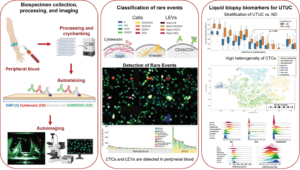Bladder and Upper Tract Urothelial Carcinoma
Background
Bladder cancer (BCa) is the tenth most common cancer in the world, representing 3% of all new cancer cases. Urothelial carcinoma (~90%) is the most frequent BCa histology diagnosed in the U.S., and can be subdivided by stage, grade, and subtype (conventional or variant morphology). Less common types include squamous (2–5%), adenocarcinoma (2%), and neuroendocrine (1%), as well as other rare tumors (<1%).
The standard of care for patients diagnosed with localized bladder cancer (BCa) is cystectomy. However, emerging evidence shows that the patients receiving surgical intervention often experience a return of their cancer. Examining patient blood samples for rare events, such as circulating tumor cells (CTCs) and large extracellular vesicles (LEVs), may reveal biomarkers indicative of the presence of cancer and provide an insight into disease progression.
Urothelial carcinomas (UCs) are a broad and heterogeneous group of malignancies, with the prevalence of upper tract urothelial carcinoma (UTUC) being rare, accounting for only 5–10% of total malignancies. There is a need for additional toolsets to assist the current clinical paradigm of care for patients with UTUC. As a non-invasive tool for the discovery of cancer-related biomarkers, the liquid biopsy has the potential to represent the complex process of tumorigenesis and metastasis.

News and Publications
- Shishido S, Ghoreifi A, Sayeed S, Courcoubetis G, Huang A, Ye B, Mrutyunjaya S, Gill I, Kuhn P, Mason J, Djaladat H. Liquid Biopsy Landscape in Patients with Primary Upper Tract Urothelial Carcinoma. Cancers, 2022, 14(12), 3007.
- Ghoreifi A, Shishido S, Sayeed S, Courcoubetis G, Huang A, Schuckman A, Aron M, Desai M, Daneshmand S, Gill IS, Kuhn P, Djaladat H*, Mason J*. Blood-based liquid biopsy: A promising noninvasive test in diagnosis, surveillance, and prognosis of patients with upper tract urothelial carcinoma. Urologic Oncology: Seminars and Original Investigations, 2024, ISSN 1078-1439.
Contact Us
USC Michelson Center
Convergent Science Institute in Cancer
1002 Childs Way
Los Angeles, CA 90089
